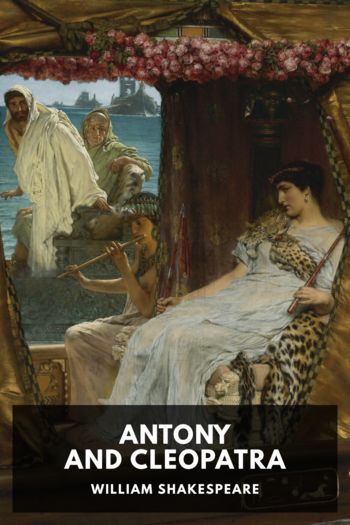Commentaries on the Gallic War, Julius Caesar [the chimp paradox TXT] 📗

- Author: Julius Caesar
Book online «Commentaries on the Gallic War, Julius Caesar [the chimp paradox TXT] 📗». Author Julius Caesar
Caesar, on observing these movements, sends Labienus with six cohorts to relieve his distressed soldiers: he orders him, if he should be unable to withstand them, to draw off the cohorts and make a sally; but not to do this except through necessity. He himself goes to the rest, and exhorts them not to succumb to the toil; he shows them that the fruits of all former engagements depend on that day and hour. The Gauls within, despairing of forcing the fortifications in the plains on account of the greatness of the works, attempt the places precipitous in ascent: hither they bring the engines which they had prepared; by the immense number of their missiles they dislodge the defenders from the turrets: they fill the ditches with clay and hurdles, then clear the way; they tear down the rampart and breastwork with hooks.
Caesar sends at first young Brutus, with six cohorts, and afterwards Caius Fabius, his lieutenant, with seven others: finally, as they fought more obstinately, he leads up fresh men to the assistance of his soldiers. After renewing the action, and repulsing the enemy, he marches in the direction in which he had sent Labienus, drafts four cohorts from the nearest redoubt, and orders part of the cavalry to follow him, and part to make the circuit of the external fortifications and attack the enemy in the rear. Labienus, when neither the ramparts or ditches could check the onset of the enemy, informs Caesar by messengers of what he intended to do. Caesar hastens to share in the action.
His arrival being known from the colour of his robe, and the troops of cavalry, and the cohorts which he had ordered to follow him being seen, as these low and sloping grounds were plainly visible from the eminences, the enemy join battle. A shout being raised by both sides, it was succeeded by a general shout along the ramparts and whole line of fortifications. Our troops, laying aside their javelins, carry on the engagement with their swords. The cavalry is suddenly seen in the rear of the Gauls: the other cohorts advance rapidly; the enemy turn their backs; the cavalry intercept them in their flight, and a great slaughter ensues. Sedulius the general and chief of the Lemovices is slain; Vergasillaunus, the Arvernian, is taken alive in the flight, seventy-four military standards are brought to Caesar, and few out of so great a number return safe to their camp. The besieged, beholding from the town the slaughter and flight of their countrymen, despairing of safety, lead back their troops from the fortifications. A flight of the Gauls from their camp immediately ensues on hearing of this disaster, and had not the soldiers been wearied by sending frequent reinforcements, and the labour of the entire day, all the enemy’s forces could have been destroyed. Immediately after midnight, the cavalry are sent out and overtake the rear, a great number are taken or cut to pieces, the rest by flight escape in different directions to their respective states. Vercingetorix, having convened a council the following day, declares, “That he had undertaken that war, not on account of his own exigencies, but on account of the general freedom; and since he must yield to fortune, he offered himself to them for either purpose, whether they should wish to atone to the Romans by his death, or surrender him alive.” Ambassadors are sent to Caesar on this subject. He orders their arms to be surrendered, and their chieftains delivered up. He seated himself at the head of the lines in front of the camp, the Gallic chieftains are brought before him. They surrender Vercingetorix, and lay down their arms. Reserving the Aedui and Arverni, to try if he could gain over, through their influence, their respective states, he distributes one of the remaining captives to each soldier, throughout the entire army, as plunder.
After making these arrangements, he marches into the country of the Aedui, and recovers that state. To this place ambassadors are sent by the Arverni, who promise that they will execute his commands. He demands a great number of hostages. He sends the legions to winter quarters; he restores about twenty thousand captives to the Aedui and Arverni; he orders Titus Labienus to march into the country of the Sequani with two legions and the cavalry, and to him he attaches Marcus Sempronius Rutilus; he places Caius Fabius, and Lucius Minucius Basilus, with two legions in the country of the Remi, lest they should sustain any loss from the Bellovaci in their neighbourhood. He sends Caius Antistius Reginus into the country of the Ambivareti, Titus Sextius into the territories of the Bituriges, and Caius Caninius Rebilus into those of the Ruteni, with one legion each. He stations Quintus Tullius Cicero, and Publius Sulpicius among the Aedui at Cabillo and Matisco on the Saône, to procure supplies of corn. He himself determines to winter at Bibracte. A supplication of twenty days is decreed by the senate at Rome, on learning these successes from Caesar’s despatches.
EndnotesRoman miles. ↩
I.e. the 28th of March. ↩
BC 58. ↩
According to their own representations. The Latin oratio obliqua, indirect citation, is meant to declare not





Comments (0)